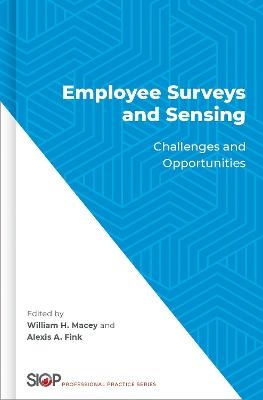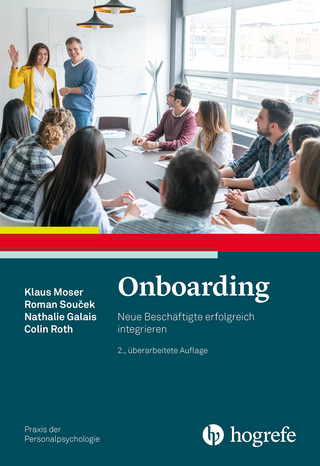
Employee Surveys and Sensing
Oxford University Press Inc (Verlag)
978-0-19-093971-7 (ISBN)
The book is appropriate for use in advanced graduate level courses in survey research and will be a valuable shelf resource for survey practitioners whether trained formally in I-O psychology or other areas of organizational science.
William H. Macey, Ph.D., is Senior Research Fellow at CultureFactors, Inc. He was the CEO of Valtera Corporation for 35 years until the acquisition of Valtera by CEB in 2012. A SIOP past-president, he is a Fellow of SIOP, APA, and APS and was recipient of SIOP's Professional Contributions Award in 2017. He is a current member of the editorial board of the Journal of Business and Psychology. He received his Ph.D. from Loyola University Chicago in 1975 in Experimental Psychology. His current professional interests include organizational surveys, culture and climate, and leader assessment. Some of his more widely cited publications include "The Meaning of Employee Engagement" (Macey & Schneider, 2008); and "Employee Engagement: Tools for Analysis, Practice, and Competitive Advantage" (Macey, Schneider, Barbera & Young, 2009). Alexis A. Fink, Ph.D., is Vice President, People Analytics and Workforce Strategy at Facebook. She has previously held similar roles at Microsoft and Intel, and has done extensive work in organizational transformation, organizational culture, leadership assessment, and the application of advanced analytical methods to human capital problems. She is a Fellow of SIOP, a 2019 recipient of SIOP's Distinguished Service Award, and past Chair of the IT Survey Group, an industry consortium dedicated to employee surveys. She earned her Ph.D. in Industrial/Organizational Psychology at Old Dominion University in 2000. She also serves as the Practice Editor for Industrial and Organizational Psychology: Perspectives on Science and Practice.
Chapter 1. Employee Surveys and Sensing: Challenges and Opportunities
William H. Macey and Alexis A. Fink
Chapter 2 Strategic Surveying for Driving Organizational Change: A Very 3M Story
Karen B. Paul and Kristofer J. Fenlason
Chapter 3. Improving the Design and Interpretation of Sample Surveys in the Workplace
Paul M. Mastrangelo
Chapter 4. Exploring the Universe of Pulse Surveys & Continuous Listening Opportunities
Jeffrey A. Jolton and Cameron Klein
Chapter 5 Lifecycle Surveys: Individual and Organizational Journeys
Jeffrey Saltzman, Scott Brooks, and Victoria Hendrickson
Chapter 6 Design and Application of Employee Engagement Surveys: An Evidence-Based Approach
John P. Meyer
Chapter 7. Focus Groups: Blending Qualitative and Quantitative Methodology to Improve the Survey Process
Jeffrey M. Cucina and Ilene F. Gast
Chapter 8. Strategic Climate Research: How What We Know Should Influence What We Do
Benjamin Schneider
Chapter 9. The Unique Role of Corporate Culture in Employee Listening Systems
Daniel Denison, Marcus Dickson, Michelle Mullins, and Jessie Sanchez
Chapter 10. Employee Preferences: Why They Matter and How to Measure Them
Diane Daum and Jennifer Stoll
Chapter 11. How Did We Do? Survey Benchmarking and Normative Data
Elizabeth A. McCune and Sarah R. Johnson
Chapter 12. Writing Organizational Survey Items that Predict What Matters in Organizations
Daniel Ingels, Kathryn Keeton, and Christiane Spitzmueller
Chapter 13. Open-ended questions: The role of Natural Language Processing and Text Analytics
Subhadra Dutta and Eric O'Rourke
Chapter 14. Is the Engagement Survey The Only Way? Alternative Sources for Employee Sensing
Madhura Chakrabarti and Elizabeth A. McCune
Chapter 15. Mechanics of Survey Data Analysis
Melinda J. Moye and Alison L. O'Malley
Chapter 16. Taking Action to Drive Change through Survey Key Driver Analysis
Jeff W. Johnson
Chapter 17. Linkage Analysis: Tying Employee Attitudes to Business Outcomes
Shawn Del Duco, Patrick Hyland, David Reeves, and Anthony Caputo
Chapter 18. Optimizing Differences Between Groups is Important: Examples from Applied Settings
Paul Bliese, Eliza Wicher, and Dhuha "Dee" Abdulsallam
Chapter 19. Data Visualization
Evan F. Sinar
Chapter 20. Creating and Delivering the Executive Presentation: Telling the Story of the Survey
Sarah R. Johnson
Chapter 21. Artificial Intelligence-Augmented Action Taking
Sara P. Weiner and Melissa McMahan
Chapter 22. Rediscovering the Art of Surveys for Organization Change
Allan H. Church and Melissa McMahan
Chapter 23. Employee Survey Research: A Critical Review of Theory and Practice
Lewis Garrad and Patrick K. Hyland
Chapter 24. From Identified Surveys to New Technologies: Employee Privacy and Ethical Considerations
Lise M. Saari and Charles A. Scherbaum
Chapter 25. Managing Workplace Job Attitudes and Performance in Organizations with Labor Unions
Jim Harter and Denise McLain
Chapter 26. Current and Future Trends in Employee Survey Practice: A View from Employee Survey Practitioners
Christopher T. Rotolo, Christina Fleck, and Brittnie Shepherd
Chapter 27. Employee Surveys Move into the Future: A Tale of Evolution, Revolution and Speed Bumps
Allen I. Kraut
| Erscheinungsdatum | 30.04.2020 |
|---|---|
| Reihe/Serie | The Society for Industrial and Organizational Psychology Professional Practice Series |
| Verlagsort | New York |
| Sprache | englisch |
| Maße | 160 x 236 mm |
| Gewicht | 862 g |
| Themenwelt | Geisteswissenschaften ► Psychologie ► Arbeits- und Organisationspsychologie |
| Wirtschaft ► Betriebswirtschaft / Management | |
| ISBN-10 | 0-19-093971-0 / 0190939710 |
| ISBN-13 | 978-0-19-093971-7 / 9780190939717 |
| Zustand | Neuware |
| Haben Sie eine Frage zum Produkt? |
aus dem Bereich


